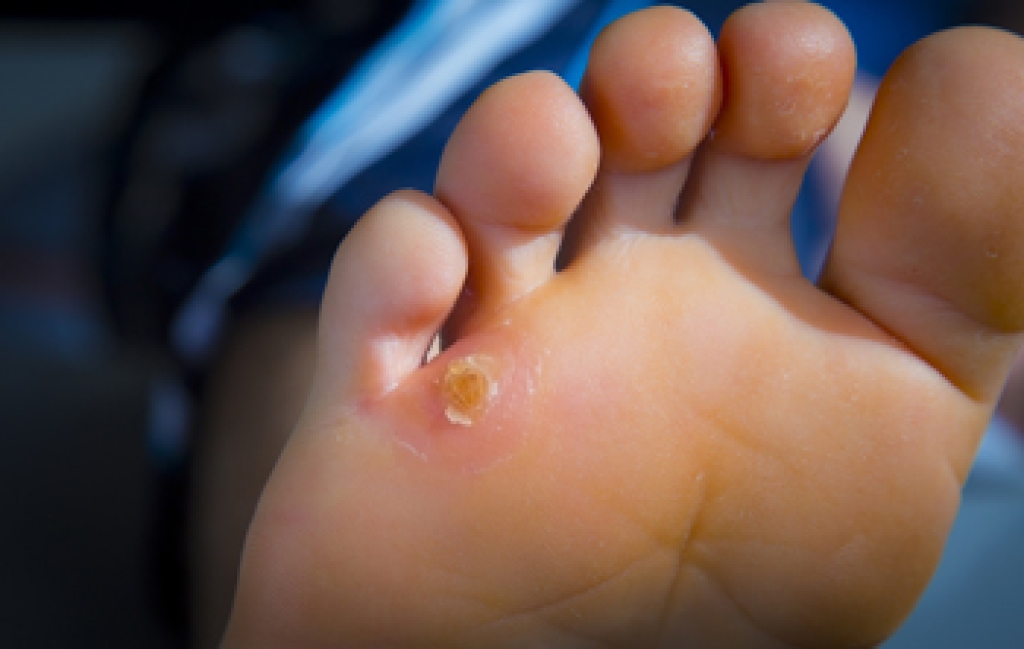Blog
When to See a Podiatrist About Your Plantar Warts
 Plantar warts are caused by HPV and normally take the form of small growths that appear as lesions on the weight-bearing regions of one’s foot. While they are not seen as a serious health concern, it is important to treat these warts to maintain the health of your feet. Plantar warts most commonly affect children and teenagers, those with weak immune systems, and those who tend to walk barefoot on wart-causing surfaces like locker rooms. If you notice your lesion is bleeding, painful, or has changed color, it is recommended that you consult with a podiatrist. If the warts do not go away on their own or keep returning, and you are experiencing discomfort with normal activities, it is also advised you seek further help. Keeping your feet clean and dry, avoiding picking at your warts, and changing your shoes and socks daily are a few ways to help prevent plantar warts from appearing. If you would like to seek further information about plantar warts or would like the assistance of a professional to treat your plantar warts, we recommend you consult with a podiatrist.
Plantar warts are caused by HPV and normally take the form of small growths that appear as lesions on the weight-bearing regions of one’s foot. While they are not seen as a serious health concern, it is important to treat these warts to maintain the health of your feet. Plantar warts most commonly affect children and teenagers, those with weak immune systems, and those who tend to walk barefoot on wart-causing surfaces like locker rooms. If you notice your lesion is bleeding, painful, or has changed color, it is recommended that you consult with a podiatrist. If the warts do not go away on their own or keep returning, and you are experiencing discomfort with normal activities, it is also advised you seek further help. Keeping your feet clean and dry, avoiding picking at your warts, and changing your shoes and socks daily are a few ways to help prevent plantar warts from appearing. If you would like to seek further information about plantar warts or would like the assistance of a professional to treat your plantar warts, we recommend you consult with a podiatrist.
Plantar warts can be very uncomfortable. If you need your feet checked, contact one of our podiatrists from PA Foot & Ankle Associates. Our doctors will assist you with all of your foot and ankle needs.
About Plantar Warts
Plantar warts are the result of HPV, or human papillomavirus, getting into open wounds on the feet. They are mostly found on the heels or balls of the feet.
While plantar warts are generally harmless, those experiencing excessive pain or those suffering from diabetes or a compromised immune system require immediate medical care. Plantar warts are easily diagnosed, usually through scraping off a bit of rough skin or by getting a biopsy.
Symptoms
- Lesions on the bottom of your feet, usually rough and grainy
- Hard or thick callused spots
- Wart seeds, which are small clotted blood vessels that look like little black spots
- Pain, discomfort, or tenderness of your feet when walking or standing
Treatment
- Freezing
- Electric tool removal
- Laser Treatment
- Topical Creams (prescription only)
- Over-the-counter medications
To help prevent developing plantar warts, avoid walking barefoot over abrasive surfaces that can cause cuts or wounds for HPV to get into. Avoiding direct contact with other warts, as well as not picking or rubbing existing warts, can help prevent the further spread of plantar warts. However, if you think you have developed plantar warts, speak to your podiatrist. He or she can diagnose the warts on your feet and recommend the appropriate treatment options.
If you have any questions, please feel free to contact one of our offices located in Allentown, Easton, Northampton, and Chew Street in Allentown, PA . We offer the newest diagnostic and treatment technologies for all your foot care needs.
Foot Ulcers and Prompt Treatment
 Wounds on the feet are common in diabetic patients. Many patients may have difficulty in feeling any discomfort on their feet, which may be a result of neuropathy. It is important to inspect your feet daily if you are diabetic, so any cuts, scrapes, or bruises can be promptly treated. A sore on the foot may lead to a foot ulcer. This is a type of wound that can possibly lead to amputation and must be diagnosed and treated correctly. Some of the symptoms that are associated with this type of wound can consist of a foul odor emanating from the area, swelling, and it is often painful when walked on. It is beneficial to properly clean the wound, apply the correct dressing, and wear shoes that have ample room for the entire foot. If you are afflicted with diabetes, and have developed a foot ulcer, it is strongly suggested that you are under the care of a podiatrist who can help you to manage your condition.
Wounds on the feet are common in diabetic patients. Many patients may have difficulty in feeling any discomfort on their feet, which may be a result of neuropathy. It is important to inspect your feet daily if you are diabetic, so any cuts, scrapes, or bruises can be promptly treated. A sore on the foot may lead to a foot ulcer. This is a type of wound that can possibly lead to amputation and must be diagnosed and treated correctly. Some of the symptoms that are associated with this type of wound can consist of a foul odor emanating from the area, swelling, and it is often painful when walked on. It is beneficial to properly clean the wound, apply the correct dressing, and wear shoes that have ample room for the entire foot. If you are afflicted with diabetes, and have developed a foot ulcer, it is strongly suggested that you are under the care of a podiatrist who can help you to manage your condition.
Wound care is an important part in dealing with diabetes. If you have diabetes and a foot wound or would like more information about wound care for diabetics, consult with one of our podiatrists from PA Foot & Ankle Associates. Our doctors will assess your condition and provide you with quality foot and ankle treatment.
What Is Wound Care?
Wound care is the practice of taking proper care of a wound. This can range from the smallest to the largest of wounds. While everyone can benefit from proper wound care, it is much more important for diabetics. Diabetics often suffer from poor blood circulation which causes wounds to heal much slower than they would in a non-diabetic.
What Is the Importance of Wound Care?
While it may not seem apparent with small ulcers on the foot, for diabetics, any size ulcer can become infected. Diabetics often also suffer from neuropathy, or nerve loss. This means they might not even feel when they have an ulcer on their foot. If the wound becomes severely infected, amputation may be necessary. Therefore, it is of the upmost importance to properly care for any and all foot wounds.
How to Care for Wounds
The best way to care for foot wounds is to prevent them. For diabetics, this means daily inspections of the feet for any signs of abnormalities or ulcers. It is also recommended to see a podiatrist several times a year for a foot inspection. If you do have an ulcer, run the wound under water to clear dirt from the wound; then apply antibiotic ointment to the wound and cover with a bandage. Bandages should be changed daily and keeping pressure off the wound is smart. It is advised to see a podiatrist, who can keep an eye on it.
If you have any questions please contact one of our offices located in Allentown, Easton, Northampton, and Chew Street in Allentown, PA . We offer the newest diagnostic and treatment technologies for all your foot and ankle needs.
Podiatrists and the Anatomy of the Feet
If you are seeking a doctor who specializes in the anatomy of the foot, you will be looking for the services of a podiatrist. This type of doctor can treat a variety of foot conditions, consisting of ingrown toenails, pain in the heel and arch areas, and medical conditions that often include arthritis and diabetes. Podiatrists can own a private practice, or may be employed in a hospital. Research has indicated it may be beneficial to wear the shoes that are normally worn for everyday activities when you initially visit a podiatrist. This may be helpful in determining the cause of your specific foot condition. If your feet feel tired, or you are experiencing any type of foot pain, it is advised that you consult with a podiatrist as quickly as possible so the correct diagnosis can be performed and the proper treatment can begin.
If you are experiencing pain in the feet or ankles, don’t join the stubborn majority refusing treatment. Feel free to contact one of our podiatrists from PA Foot & Ankle Associates. Our doctors can provide the care you need to keep you pain-free and on your feet.
What Is a Podiatrist?
Someone would seek the care of a podiatrist if they have suffered a foot injury or have common foot ailments such as heal spurs, bunions, arch problems, deformities, ingrown toenails, corns, foot and ankle problems, etc.
Podiatric Treatment
A podiatrist will treat the problematic areas of the feet, ankle or lower leg by prescribing the following:
- Physical therapy
- Drugs
- Orthotic inserts or soles
- Surgery on lower extremity fractures
A common podiatric procedure a podiatrist will use is a scanner or force plate which will allow the podiatrist to know the designs of orthotics. Patients are then told to follow a series of tasks to complete the treatment. The computer will scan the foot a see which areas show weight distribution and pressure points. The podiatrist will read the analysis and then determine which treatment plans are available.
If you have any questions, please feel free to contact one of our offices located in Allentown, Easton, Northampton, and Chew Street in Allentown, PA . We offer the newest diagnostic and treatment technologies for all your foot care needs.



